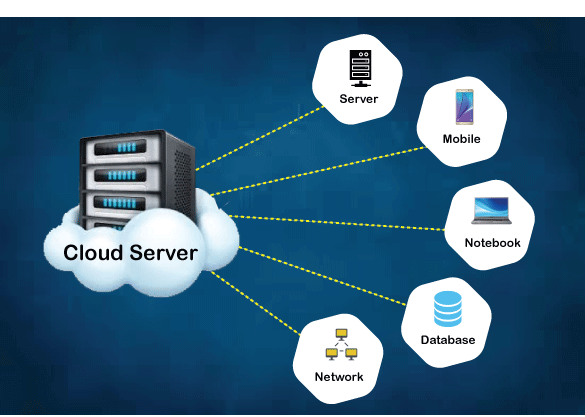What Is The Difference Between Server And Cloud server
A server is a computer that provides data to other computers on a network. They can be used for various purposes, such as storing data, running software, or streaming content. Cloud servers, on the other hand, are computers that are used to store data and run software on the Internet. Cloud servers are more scalable and flexible than traditional servers, and they can be accessed from anywhere in the world.
What is Server:
A server is a computer that provides data to other computers on a network. They can be used for various purposes, such as storing data, running software, or streaming content and are often more powerful than the average desktop computer. Servers typically have more storage space and memory than a desktop computer, and they may also have special features, such as a RAID array, that helps to protect data.
What is Cloud Server:
A cloud server is a computer that is used to store data and run software on the Internet. Cloud servers are more scalable and flexible than traditional servers, and they can be accessed from anywhere in the world. Cloud servers are often used for applications that need to be able to handle sudden increases in traffic, such as social networking sites or ecommerce stores.
Benefits Of Cloud Hosting
Flexibility: Cloud hosting services are highly scalable, meaning that they can be easily adjusted to meet the changing needs of a business.
Cost-Effective: Because customers only pay for the resources that they use, cloud hosting can be a very cost-effective solution.
Reliable: Cloud hosting services are often backed by large and reliable organizations, meaning that they can be counted on to provide a high level of uptime.
Secure: Cloud hosting services make use of the latest security technologies to protect customer data.
Green: Because cloud hosting services make use of virtualized resources, they can be a more environmentally-friendly option than traditional hosting solutions.
Drawbacks Of Cloud Hosting
Security: Because data is stored off-site on servers that are managed by a third-party, there is a heightened risk of data breaches.
Dependence on Internet: Cloud hosting services rely on a constant and reliable internet connection in order to function properly.
Vendor Lock-In: Because businesses rely on cloud providers to store and manage their data, they can be vulnerable to vendor lock-in, where a business is essentially held hostage by a cloud provider.
Service Interruptions: Although cloud providers work to maintain a high level of uptime, service interruptions can still occur.
Costs: Although cloud hosting can be cost-effective in the long run, initial costs can be high, and businesses may need to scale up their use of resources in order to see savings.
Benefits Of Server Computing
- Increased storage and processing power – With a server, you can store more data and run more complex applications than you could with a traditional desktop computer.
- Enhanced security – Servers typically have better security features than desktop computers, making them less vulnerable to viruses and hackers.
- Improved reliability – Since servers are designed for 24/7 operation, they are often more reliable than desktop computers.
- Greater scalability – A server can be easily expanded to meet the growing needs of a business.
- Increased flexibility – A server can be accessed from anywhere in the world, making it a convenient solution for businesses with employees in multiple locations.
Drawback Of Server Computing
- Higher cost – Servers can be more expensive than desktop computers, both upfront and in terms of ongoing maintenance.
- Requires specialized knowledge – Setting up and managing a server can be a complex process, and it generally requires someone with specialized knowledge.
- Requires a dedicated space – Servers need to be stored in a dedicated space with proper ventilation to keep them from overheating.
- Requires a reliable power source – Servers need a reliable power source to ensure uninterrupted operation.
- Can be noisy – Servers can generate a lot of noise, so they may not be ideal for use in a home office.

